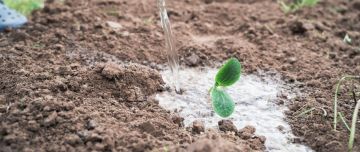
The module will review soil biological, chemical, and physical processes and provide demonstration and explanation in field assessment techniques and laboratory analysis. The enhancement of soil biological processes to improve soil nutrient cycling and recycling will be analysed and evaluated. The role of soil texture and structure on drainage, soil trafficability, and water availability will be examined paying particular attention to the management of soil physical quality. The primary objective of this course is to enable, and empower, participants to assess soil profiles in the landscape and understand how to prevent and mitigate soil degradation and improve overall soil health, function, and water relations for sustainable food production.
- Soil biological, chemical, and physical field assessment and laboratory analysis methods
- Soil nutrient and mineral balancing to optimise animal and plant production
- Feeding soil for enhanced soil biological activity for improved nutrient cycling and recycling
- Soil fertility maintenance necessary for plant, animal and human health following transition to organic low input systems
- Assessment of soil structure and prevention and mitigation of degradation, compaction, and erosion
- Optimising the water cycle - effective versus non-effective rainfall and water availability and storage
- Harnessing water resources for livestock hydration and maintenance and crop irrigation systems
- Developing policy and regulation for soil and water management in the EU Green Deal, F2F Strategy, and the Programme for Climate Action
Discounted / Part-Funded Places Through NOTS:
Eligible participants in Ireland can avail of a 40% cost reduction on course fees through our MSc course partners National Organic Training Skillnet. Contact NOTS by calling 071 9640688 or email [email protected] for more information on eligibility for these reduced fees.
The module will be delivered during one 12 week semester each academic year with online lecture and webinar sessions each week. Course days will also be held during the semester to avail of optimal field conditions for soil profile assessment and water movement appraisal. Laboratory and field practicals will be held at the SETU Waterford Campus and the West Campus in Carriganore. Case study assessments and farm audits will be held during the semester at spaced intervals and the final written exam will be held at the end of the semester.
On successful completion of this module, a student will be able to:
- Describe and explain priority field and laboratory practices for soil assessment, analysis methods and techniques.
- Interpret soil analyses to estimate optimum inorganic and organic fertiliser levels required to balance the soil nutrient profile for improved output and production.
- Show how to enhance soil micro-organism activity to enhance soil biological processes for nutrient cycling and recycling.
- Categorize and discriminate between different land management practices to reverse soil degradation and improve physical function.
- Arrange and combine evidence for natural water management practices to develop plans for climate resilient production.
- Estimate and evaluate the cost-effectiveness and profitability of water irrigation systems and storage practices for crop and livestock production.
- Critique, interpret and summarize appropriate and relevant scientific research information and associated best practice for climate resilient soil and water management.
Applicants must hold a National Framework of Qualification (NFQ) Level 8 honours degree in Agri-business and Rural Enterprise, Agriculture, Environmental and Land Science, or other Science-related discipline. Offers will be made based on the applicant’s Grade Point Average (GPA). Applicants who hold a Level 8 degree in a non-cognate area may be considered for entry under SETU’s Recognition of Prior Learning (RPL) mechanism and equal weighting will be given for GPA qualifications (50%) and a selection interview (50%) to assess prospective candidate’s aptitude and experience relevant to the certificate programme.
Graduates with the Level 9 Certificate in Soil Health and Water Management may wish to apply the knowledge and practices learned in primary commercial production, provide support and technical advice to growers and farmers or may opt to remain in a research, development and innovation environment. They may also use their applied knowledge and skills in public service for the development of supportive agricultural, climate, and environmental policy.
Upon successful completion of other Level 9 Certificates the learner can graduate with a Certificate in Organic and Biological Production (30 credits), a Postgraduate Diploma in Organic and Biological Agriculture (60 credits), plus a dissertation for a MSc in Organic and Biological Agriculture (90 credits).
Course Leaders



